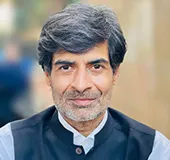Last month, Germany convened the first-ever G20 “digital ministers” meeting, indicating how the future of connected societies and economies is now firmly at the top of the global agenda. In the run- up to the ministerial meeting, a T20 task force comprising think tanks and academia, of which this author was co-chair, was constituted to offer recommendations that would strengthen digital economies and manage the “digitalization” of traditional sectors. A prominent concern outlined by this group related to the threat to global financial systems because of greater interconnectivity and the creation of novel, untested architectures to manage payment processes. No country is more affected by the weaknesses in digital payments systems, global and domestic, than India, which is tackling the twin challenge of Internet adoption and expansive digitalization.
The future of global financial systems is tied to the security of the digital networks that sustain them. A recent report by UK-based insurance company Hiscox suggests cyberattacks cost the global economy nearly $450 billion. Whether in platforms like the UN group of governmental experts on information security, or through traditional trade agreements, the international community has struggled to offer a collective response to threats faced by the digital economy. The G20 digital ministers meeting is, therefore, a step in the right direction to give this issue the political visibility it needs.
The meeting resulted in the creation of a working group on the digital economy to articulate rules of operation for businesses, governments and users transacting on the Internet. The larger mandate of this working group is the creation of a strategy for securing the global digital economy. India should contribute to the working group’s findings, as its digital economy is qualitatively and quantitatively different from those of the advanced industrialized nations.
The working group will have to address concerns around security, digital access and international trade. Cybersecurity, traditionally understood, has come to mean the integrity of platforms, digital networks and devices. But the G20 should assess whether cybersecurity is a business objective or a means towards the larger goal of promoting digital access and financial inclusion. Should it be the latter, any ecosystem design should ensure affordability and affordable security for users at the bottom of the pyramid. The working group should also articulate policies for the digital economy that can be emulated in developing countries outside the G20. And finally, the G20 is responsible for ensuring that digital supply chains are not fragmented in this era of “de-globalization”. This is a real threat, and as the recent communique from the G20 finance ministers’ meeting suggests, the group was unable to defend the virtues of an open trading system.
The availability of digital infrastructure is not the holy grail for emerging markets. Even if the last user in the developing world were to be provided affordable and uninterrupted Internet access—a challenge in itself—her digital consumption would ride on the skills available, cybersecurity awareness, and the level of inclusion offered by technological platforms developed in advanced economies. Scholars Urvashi Aneja and Vidisha Mishra at the Observer Research Foundation make the case for a G20-wide “digital skills upliftment strategy” that can improve labour participation and competitive capacities for women and marginalized communities.
Yet another concern that the working group should address is the impact of “digitalization” on traditional industrial sectors. Here too, India like others in the developing world, is in the cross hairs of pervasive automation and the use of “intelligent” technologies. Automation will affect manufacturing jobs, and economists like Ester Faia suggest that it poses a risk to the service sector as well. Faia’s analysis, submitted as a working paper to the T20 group, also shows that the financial services sector, considered a safe haven in times of economic transition, has a 90% probability of automation in certain countries. A services-driven economy like India, therefore, must manage this disruptive transition and potential loss of jobs effectively.
How the shift to automated supply chains will affect the country’s urban demographic is also a question worthy of the Indian policymakers’ attention. For instance, as industrial supply chains become digitized, highly skilled jobs have clustered around certain urban centres with a technological focus—San Francisco, Phoenix and Munich, to name a few. Similarly, traditional manufacturing centres like Detroit and Liverpool have seen jobs plummet because of automation. Unpredictable employment trends alongside the current problems of unplanned urbanization will challenge economies within and outside the G20. This in turn will give rise to new domestic political dynamics that may sometimes clash with the G20’s stated objective of promoting globalization.
How can the G20 manage the tailwinds of such disruptive automation and “digitalization”? Carl Frey of the Oxford Martin School suggests that this disruption should be countered by policies that enable urban mobility and create a wide social safety net, such as one for national relocation support. There are discussions in India and in Silicon Valley about providing a universal basic income to manage this new dynamic. But can conservative financial institutions that thrive on old notions of risk as it relates to lending and banking adapt to such policies? The G20, through national and transnational policies, has always engaged with the formal economy. Its best shot at managing disruptive digital forces may ironically lie in embracing the informal sector via technology. Digital platforms will allow governments to provide social benefits to constituencies that formal financial instruments have been traditionally blind to, provided the G20 fosters linkages between the trifecta of traditional financial institutions, first-generation Internet users and the informal sources of their livelihood.
This commentary originally appeared in Live Mint.
The views expressed above belong to the author(s). ORF research and analyses now available on Telegram! Click here to access our curated content — blogs, longforms and interviews.




 PREV
PREV


